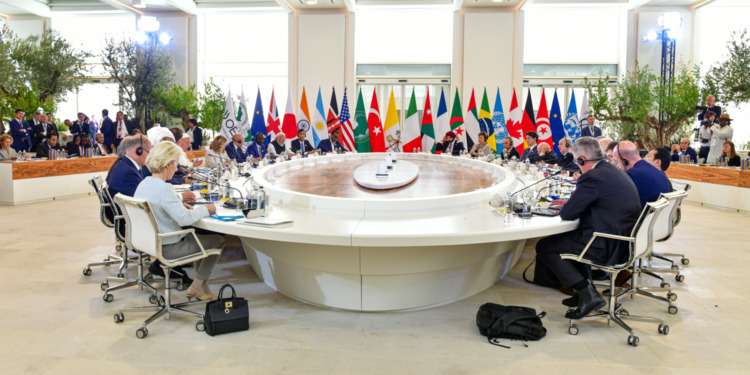This month, on June 11, the Rockefeller Foundation made public its report, “One World, One Health. A Strategic Vision for a Resilient Global Health System.”
This report was born as a policy brief for Think7 (T7). T7 is the Group of 7 (G7) official engagement group that brings together leading think tanks and research centers from around the world to provide evidence-based advice and policy recommendations for the G7 Presidency. T7 policy briefs serve as background material for the T7 Final Communiqué to be presented to the Presidency ahead of the G7 Summit — in this case, it was presented to the Italian Presidency as the G7 was held in Italy, in the Apulia Region and chaired by the President of the Council of Ministers, Giorgia Meloni.
Unfortunately the term One Health — meaning the approach that recognizes the interconnectedness of human, animal, plant, and environmental health — was not explicitly mentioned in the official summit documents. Yet the themes of food security, health security, and climate change as addressed by the Summit all aligned with the One Health approach, and the G7 launched several initiatives to address food insecurity and strengthen health systems worldwide.
In particular, the leaders discussed ways to enhance equitable access to medical countermeasures, strengthen collaborative surveillance, and address antimicrobial resistance. President Biden and G7 leaders called for at least $2 billion in new pledges for the Pandemic Fund, and pledges equal to or greater than that for catalytic financing, which helps developing countries build pandemic prevention, preparedness, and response capacities. They additionally committed to concrete progress to boost surge financing for medical countermeasure (MCM) to enable countries to quickly procure, produce, and deliver MCMs during future pandemics.
So, looking at this from a One Health lens, they made some progress but missed out on some crucial aspects. Therefore, it is worthwhile recalling what is at stake here and what can be done to meet future health challenges. By now we collectively know that there is a real prospect we will be facing new pandemics in the future, and that they are most likely to emerge from the zonosphere since it has been the cradle of 70% of epidemics in our past.
In this respect, the Rockefeller Foundation’s report is of special interest. Meant to contribute to Section 5: Navigating the Health Impacts of Climate Change: A Call for Financing, it highlights the critical role that G7 countries play in promoting integrated financing of climate action in the global health architecture to ensure that health is considered an integral part of the climate adaptation agenda.
Related Articles: The Concept of One Health Turns Global in 2021: How it was Born | Experts Call for Global Adoption of One Health in Prestigious Publication | One Health: A Paradigm Whose Time Has Come? | One Planet, One Health | One Health Needs More Soft Power
As the Rockefeller Foundation states in introducing its report, a collaborative framework is set out for the G7 nations that is intended to be implemented in collaboration with G20, alongside partnerships with pivotal global health entities such as the Global Fund, WHO, GAVI and Unitaid. The aim is “to significantly elevate health outcomes across the globe, with a particular focus on bolstering support for low- and middle-income countries.”
The report makes the following key recommendations:
- Build upon WHO-led Global Action Plan for Sustainable Development Goal 3 (SDG 3) to improve global health response efficiency by enhancing coordination among key health organizations and integrating its Task Force Policy Brief One Health approach. Priorities include aligning global health strategies on country needs, and establishing a rapid response mechanism. Expected outcomes are enhanced disease control, integrated health strategies and a resilient global health infrastructure.
- Set up a Global Public Investment Alliance to secure sustainable funding for SDGs and global public goods such as global health and ensure flexible financing mechanisms. Such an initiative would aim to develop innovative financing models, engage the private sector, ensure financial flexibility and equity, and support domestic resource mobilization in lower- and middle-income countries (LMICs). It would leverage additional financial resources for global health initiatives, the ability to rapidly respond to health crises on the financial level, and stronger partnerships with the private sector and multilateral development banks for global health challenges.
- Financially commit a substantial part of global health aid to fund the Global Fund, GAVI, Unitaid and the Pandemic Fund, not forgetting neglected tropical diseases (NTD) programs (supporting the delivery of the WHO’s NTD road map to contribute towards the target of 100 countries eliminating at least one NTD by 2030).
These are valuable recommendations, consistent with what has been argued for years in Impakter. And specifically, regarding One Health, there is this guide as phrased by the report’s authors:
Integrate the One Health approach into global health policies, representing a forward-thinking strategy to enhance global health security
This should be a priority for the G-7, beyond to the G-20, and in other fora such as the United Nations General Assembly and its organizations. A comprehensive One Health approach will benefit all; it will require going further than acknowledgment in reports, communiques, and statements. It means providing sustained financing and concrete assistance to countries and regions. We can hope…
Editor’s Note: The opinions expressed here by the authors are their own, not those of Impakter.com — Cover Photo Credit: G7 Italia.










